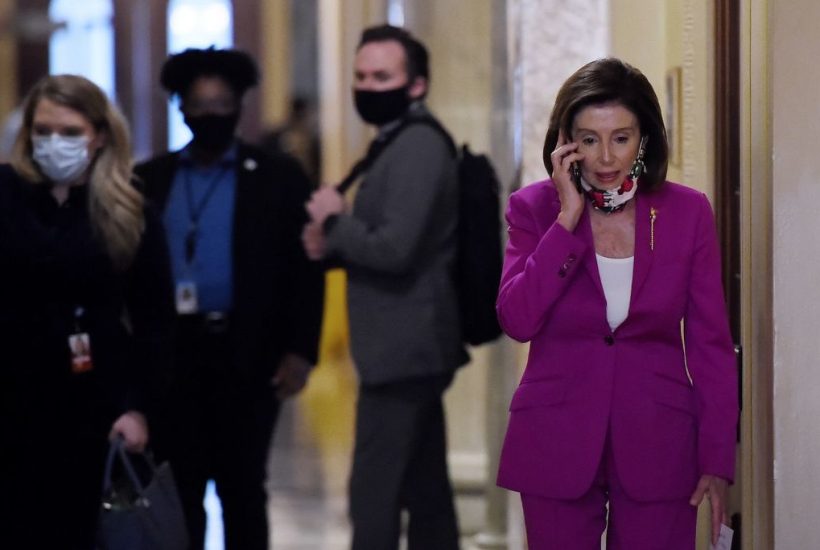When House Democrats passed their $3 trillion coronavirus ‘relief’ package late last week, they also jammed through a rules change on proxy voting that fundamentally transforms the nature of the House of Representatives and junks centuries of tradition.
Because of a change to House rules, members will now be able to submit their votes from afar. They will not have to travel back to DC to vote: they can instead send their ‘yea’ or ‘nay’ to a colleague, who will submit it on their behalf. One member can submit up to 10 votes at a time, meaning that the will of the House, which normally takes 218 members in the chamber, could be determined with only 21 members physically present.
The new rule allows this distance voting for up to 45 days for any coronavirus-related emergency. It can be extended. Now that the precedent has been set, expect it to be trotted out repeatedly as the House finds other reasons for members to execute their constitutional responsibilities from their couches.
This is a first for the House. Not during the Spanish Flu of 1918, other pandemics (Sars, Mers, swine flu) the Civil War, even 9/11 — when the Capitol was a terrorist target — did members shirk from the one job the Constitution gives them: to assemble and vote.
The shirking is very likely unconstitutional. The Constitution’s plain text errs strongly on the side of Congress’s duty to be present, requiring the presence of a ‘quorum’ (a sufficient number of members) to conduct business. Whether this presence is required to be physical or virtual is the crux of the issue, but given the Constitution’s repeated references to ‘meeting’, ‘assembling’ and ‘attendance’, we can reasonably draw the inference that the Founders didn’t mean ‘on Zoom’.
Proxy voting violates more than just the letter of the law, however. Consider the nature of our politics itself, and what we lose when we erase the physicality of ‘in Congress, assembled.’
Being together is a fundamental feature of our politics. Of any politics. Aristotle called man a political animal, and politics is, by its nature, social. In removing the face-to-face elements of persuasion, negotiation, and the accountability of being present, the House has removed the raison d’être of politics itself: the duty to bear witness to the changes, big and small, that collectively build the character of the country.
That duty has many forms. The act of voting is just the last step in the great, intangible stew of our legislative process. There is the drafting and writing of legislation, the active negotiation among members and staff, the objections and filibusters used to draw out and amplify disagreement, and the points of order that force members to hold and clarify their positions.
It is unclear how all of this plays out from a distance. It is far likelier that without members present, bills will be written by staff, with the influence of members replaced by that of lobbyists, bureaucrats, think tanks, advocacy groups, and the rest of the interests that remain in DC, pandemic or no pandemic.
But also missing will be the debate and deliberation which have litigated issues ranging from war, to civil rights, to impeachment. This is where we find the raw power of our self-government: in its ability to gather, to agitate, to articulate, to debate the type of country we want to be.
What if Daniel Webster’s famous 1830 address on slavery and nullification had been delivered from his couch? Imagine Winston Churchill exhorting the House of Commons to ‘fight on the beaches’ and ‘never surrender’ on a tinny, stuttering, poor-WiFi-enabled WebEx call. The greatest filibusters of our time are looked upon with awe less because of their subject matter, but because of the pure physical stamina it requires to stand for hours in the Senate chamber without yielding.
Even in the face of a pandemic, Congress has a responsibility to show up — even if they do so while social distancing. The Senate — whose members are more at risk, given their age — is proving this can be done.
And showing up in a crisis is what we expect from the people we elect to be statesmen. The preservation of our self-government depends on the willingness of our elected representatives to step into the breach when called upon, even in the face of risks they know the job entails.
Proxy voting violates the letter of the law, but more importantly, its spirit. Sitting at home in sweatpants while assenting to national policy on an app diminishes both the House of Representatives, and the long tradition of leaders on whose backs — and willingness to cleave to the fundamental duties of representative government — that House is built.
Rachel Bovard is the senior director of policy at the Conservative Partnership Institute.
See the full story of Clear and absent danger: why proxy voting violates the American system on Spectator USA.
Got something to add? Join the discussion and comment below.
Get 10 issues for just $10
Subscribe to The Spectator Australia today for the next 10 magazine issues, plus full online access, for just $10.




















Comments
Don't miss out
Join the conversation with other Spectator Australia readers. Subscribe to leave a comment.
SUBSCRIBEAlready a subscriber? Log in